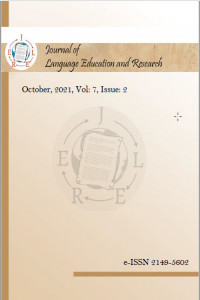Contextualized Teaching of Different Senses of “al-” in Turkish as a Foreign Language
Contextualized Teaching of Different Senses of “al-” in Turkish as a Foreign Language
Author(s): Deniz Ekin Yavaş, Funda Uzdu YıldızSubject(s): Foreign languages learning, Applied Linguistics, Lexis, Semantics, Turkic languages
Published by: T.C. MEHMET AKİF ERSOY ÜNİVERSİTESİ EĞİTİM FAKÜLTESİ
Keywords: Contextualized Teaching; Verbal Polysemy; Valence; Turkish as a Foreign Language;
Summary/Abstract: Different types of word knowledge require different approaches to teaching. It is argued that learning different senses of words takes place through constantly encountering words in different contexts. Experimental studies also show that comprehension of unknown word senses (Iravani and Ghasemi, 2013) and ambiguity resolution of polysemous words (Watanabe, 2014) are facilitated when the context is available. Verbal polysemy is especially closely related to context. Verbs can show distributional differences in their different senses and verbs have different valences in some of their senses. Based on these relations between polysemy and context, this study aims to create sentence contexts for “al-”, a high-frequency verb in Turkish, for contextualized teaching of its different senses in Turkish as a foreign language. The sentence contexts for different senses of the verb are created based on the information about its different senses’ valences.
Journal: Dil Eğitimi ve Araştırmaları Dergisi
- Issue Year: 7/2021
- Issue No: 2
- Page Range: 333-355
- Page Count: 23
- Language: English

